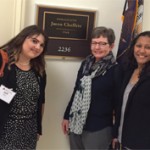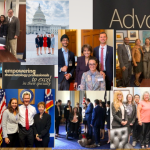Wondering what can you do to effectively promote rheumatology issues in Washington? Here are some ways you can get involved:
- Utilize the Legislative Action Center: The ACR’s Legislative Action Center provides members and patients with tools to become active, informed grassroots advocates, including a guide to Congress, lists of current legislation (including full text of the bills), and sample constituent letters. The Legislative Action Center has form letters promoting the “Arthritis Prevention Control and Cure Act of 2007” and the “Access to Medicare Imaging Act of 2007.” It also has a letter urging Congress to repair the flawed Sustainable Growth Rate formula to prevent the 10% Medicare physician reimbursement cuts in 2008. Contact Congress today.
- Join the Advocacy List Serve: The Advocacy List Serve is a forum for rheumatologists, health professionals, and patients to receive updates on current legislative and regulatory issues relating to rheumatic diseases. To subscribe, visit www.rheumatology.org and follow the links to networking list serves via the Practice Support link.
- Post an Advocacy Recruitment Easel in Your Office: Advocacy recruitment easels are available for members and advocates. They contain postcards that individuals can complete and send to the ACR to be kept informed of relevant legislative action and advocacy needs.
- Read the “Public Policy Monitor”: The “Public Policy Monitor” is a monthly publication that reports on legislative and regulatory issues, grassroots activities, and the ACR’s efforts in Washington. It is e-mailed to all U.S. ACR and ARHP members and is also available online. Reading it is a great way stay informed on legislative and regulatory issues affecting rheumatologists.
- Participate in “Advocates for Arthritis” Capitol Hill Visits: On February 25–26, 2008, the ACR will hold its annual “Advocates for Arthritis” Capitol Hill visits in Washington, D.C. The program was created to engage ACR members, health professionals, and patients in political advocacy, as well as to increase awareness of rheumatologists and rheumatic diseases on Capitol Hill. During this event, participants meet with members of Congress and their staff to discuss current legislative issues that benefit physicians and advance research, prevention, and care for patients with arthritis and other rheumatic diseases. It is a chance to establish valuable relationships with legislators who might support our issues in the future. Next year, the “Advocates for Arthritis” program will expand. The ACR plans to have briefing sessions with speakers from CMS, the National Institutes of Health (NIH), and the NIAMS, as well as members of Congress. Contact Aiken Hackett at [email protected] for more information.
- Contact ACR Government Affairs Staff: Address questions to Aiken Hackett at [email protected] or Kristin Wormley at [email protected], or by phone at (404) 633-3777.
The Government Affairs Committee and ARHP Advocacy Subcommittee will host a legislative briefing on September 19 to inform Congress and congressional staff about issues that affect rheumatologists and their patients. While the committees and staff actively work to achieve the legislative priorities of the ACR and promote rheumatology issues in Washington, it is up to each and every member to get involved.



